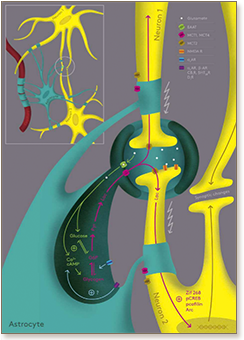 The identification of neural substrates underlying the long lasting debilitating impact of drug cues is critical for developing novel therapeutic tools. Metabolic coupling has long been considered a key mechanism through which astrocytes and neurons actively interact in response of neuronal activity, but recent findings suggested that disrupting metabolic coupling may represent an innovative approach to prevent memory formation, in particular drug-related memories. Here, we review converging evidence illustrating how memory and addiction share neural circuitry and molecular mechanisms implicating lactate-mediated metabolic coupling between astrocytes and neurons. With several aspects of addiction depending on mnemonic processes elicited by drug experience, disrupting lactate transport involved in the formation of a pathological learning, linking the incentive, and motivational effects of drugs with drug-conditioned stimuli represent a promising approach to encourage abstinence.
The identification of neural substrates underlying the long lasting debilitating impact of drug cues is critical for developing novel therapeutic tools. Metabolic coupling has long been considered a key mechanism through which astrocytes and neurons actively interact in response of neuronal activity, but recent findings suggested that disrupting metabolic coupling may represent an innovative approach to prevent memory formation, in particular drug-related memories. Here, we review converging evidence illustrating how memory and addiction share neural circuitry and molecular mechanisms implicating lactate-mediated metabolic coupling between astrocytes and neurons. With several aspects of addiction depending on mnemonic processes elicited by drug experience, disrupting lactate transport involved in the formation of a pathological learning, linking the incentive, and motivational effects of drugs with drug-conditioned stimuli represent a promising approach to encourage abstinence.